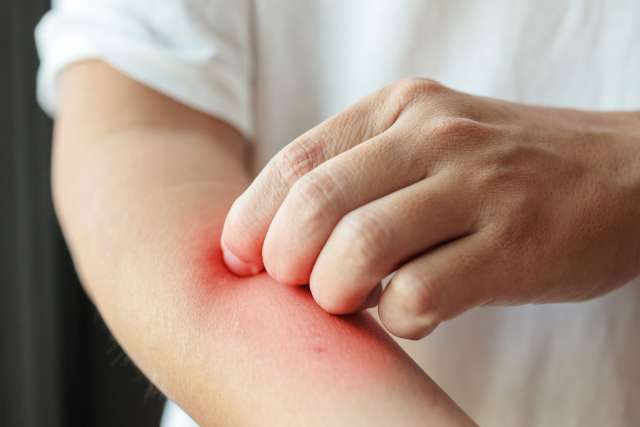Dear Doctors: I started getting patches of red, bumpy skin on my elbows last year. My doctor said it is eczema and prescribed some creams to deal with the terrible itching. They work pretty well, but I'm interested to know if there's anything I can be doing with my diet that may also be helpful.
Dear Reader: Eczema is a common skin condition marked by patches of dry, scaly, itchy and inflamed skin. It occurs in people of all ages, including newborns, children and adults.
There are several different types of eczema, but the majority of cases fall into the category of atopic dermatitis. Chief among the symptoms of this type of eczema is the persistent itching that you have been dealing with.
As you may have noticed, the symptoms of eczema tend to ebb and flow. Periods of quiet are interspersed with a return of symptoms, known as flare-ups. These can have environmental triggers, such dry or cold weather; humidity or dampness; pet dander; dust mites; the chemicals in certain perfumes, soaps or detergents; pollen; and molds. Although the exact causes of eczema are not yet clear, genetics and immune function are known to play a role. There is also a strong link to allergy. This has made the potential role of nutrition in the management of eczema flares an area of interest to researchers for several decades.
Some studies, along with anecdotal evidence from eczema patients, suggest that what someone eats and drinks can have an effect on the frequency and severity of flare-ups. For some patients, specific foods have been found to play a role in the recurrence of symptoms. These include eggs, citrus, soy products and tomatoes and other nightshade vegetables. Sugar, wheat, nuts and milk, as well as gluten and alcohol, have also come to be associated with eczema flare-ups in some people.
At this time, there are no official guidelines regarding the use of diet to manage eczema. That means someone living with the condition must become aware of whether they have an intolerance to specific foods or to certain food groups. This can involve the use of an elimination strategy to identify specific trigger foods. First, a suspect food is removed from the diet. Then, after a period of time, it is gradually reintroduced. If it coincides with an increase in eczema symptoms, it's possible that the food may be a trigger.
For many people, a good place to start is by adopting what is known as an anti-inflammatory diet. This means avoiding added sugars, simple carbs and highly processed foods. Instead, craft a diet with a focus on lean proteins, fresh fruit, vegetables and leafy greens and healthful oils. Some research suggests omega-3 fatty acids have a beneficial effect on eczema, so include fatty fish, such as salmon, sardines and mackerel. And steer clear of wheat and nightshade vegetables, which, as we discussed earlier, have been associated with eczema flares.
Some small studies, which looked at prebiotics and probiotics as a potential avenue for eczema relief, have had encouraging results. Adding naturally fermented foods to the diet may also be beneficial.
(Send your questions to askthedoctors@mednet.ucla.edu, or write: Ask the Doctors, c/o UCLA Health Sciences Media Relations, 10960 Wilshire Blvd., Suite 1955, Los Angeles, CA, 90024. Owing to the volume of mail, personal replies cannot be provided.)





